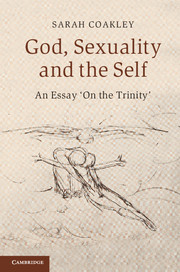Book contents
- Frontmatter
- Contents
- Illustrations
- Preface and acknowledgements
- Abbreviations
- Prelude: the arguments of this book
- Chapter 1 Recasting ‘systematic theology’: gender, desire, and théologie totale
- Chapter 2 Doing theology ‘on Wigan Pier’: why feminism and the social sciences matter to theology
- Chapter 3 Praying the Trinity: a neglected patristic tradition
- Chapter 4 The charismatic constituency: embarrassment or riches?
- Chapter 5 Seeing God: trinitarian thought through iconography
- Chapter 6 ‘Batter My Heart’: reorientations of classic trinitarian thought
- Chapter 7 The primacy of divine desire: God as Trinity and the ‘apophatic turn’
- Coda: conclusions and beyond
- Glossary of technical terms and names
- Scripture index
- General index
- References
Chapter 1 - Recasting ‘systematic theology’: gender, desire, and théologie totale
Published online by Cambridge University Press: 05 June 2014
- Frontmatter
- Contents
- Illustrations
- Preface and acknowledgements
- Abbreviations
- Prelude: the arguments of this book
- Chapter 1 Recasting ‘systematic theology’: gender, desire, and théologie totale
- Chapter 2 Doing theology ‘on Wigan Pier’: why feminism and the social sciences matter to theology
- Chapter 3 Praying the Trinity: a neglected patristic tradition
- Chapter 4 The charismatic constituency: embarrassment or riches?
- Chapter 5 Seeing God: trinitarian thought through iconography
- Chapter 6 ‘Batter My Heart’: reorientations of classic trinitarian thought
- Chapter 7 The primacy of divine desire: God as Trinity and the ‘apophatic turn’
- Coda: conclusions and beyond
- Glossary of technical terms and names
- Scripture index
- General index
- References
Summary
In the Prelude I sketched out the way that the various pieces of the argument that will follow in this book cohere. The metaphor was chosen advisedly: these pieces are not to be seen as merely broken shards, but as tesserae to be variously reconstellated in a kaleidoscope, or – by the end of this project – as eucharistic fragments to be gathered into a shared basket. I have attempted, in other words, to give just a brief glimpse of the multifaceted vision that informs this treatise ‘On the Trinity’. I have also hinted at the sort of reconception of the task of theology that is involved here: this will be a theology in via, as I called it, founded not in secular rationality but in spiritual practices of attention that mysteriously challenge and expand the range of rationality, and simultaneously darken and break one’s hold on previous certainties. Before I turn back to the world of early Christianity and to the origins of trinitarianism, I need to explain in more detail what such an ascetic, contemplative, proposal for theology actually entails.
Yet an ‘excursus on method’ is definitely something to be avoided: such a ponderous undertaking has been memorably derided as mere ‘throat-clearing’. Thus in this chapter and the next I shall not so much be clearing my throat as redirecting the mind. Without this theological redirection, the pieces on the Trinity that follow might seem strangely disconnected; without this initial analysis of my intent, a range of misleading, but currently standard, theological disjunctions might still be exercising the reader, with negative imaginative and spiritual consequences.
- Type
- Chapter
- Information
- God, Sexuality, and the SelfAn Essay 'On the Trinity', pp. 33 - 65Publisher: Cambridge University PressPrint publication year: 2013



